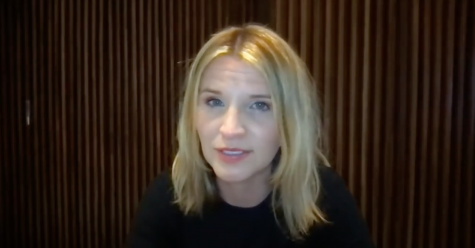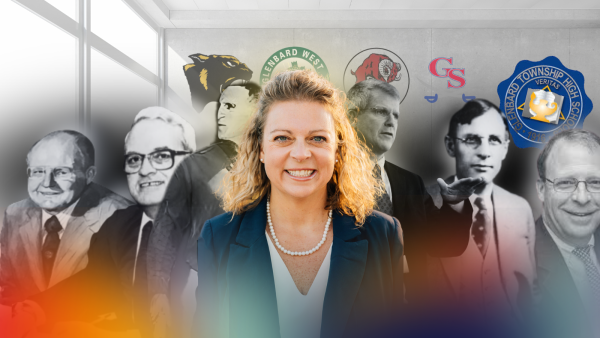Tara Westover talks about ‘Educated,’ independence, family at GPS
For Glenbard’s second semester Community-Wide Read, the Glenbard Parents Series had chosen Tara Westover, author of Educated: A Memoir, to host a book talk live-streamed by the College of DuPage on February 23rd, 2021. Tara Westover was born in Idaho to a father who opposed public education because of his radical devotion to the Mormon faith. Her educational experience as an adolescent was erratic and incomplete. In her memoir, Westover navigated through her ongoing struggle to reconcile her desire for education and independence with her desire to be loyal and connected to her family.
For the event, Westover was interviewed in-conservation by Heidi Stevens, a Chicago Tribune columnist. The dialogue between Stevens and Westover started without hesitation. Stevens began by asking Westover about her purpose for writing her memoir. Westover’s intention for her memoir was to “come [up] with a clearer understanding of [her]self.” Because her upbringing was “very confusing” and “[her] entry to college was a collision course,” her memoir was an attempt to sift through her life and “find out what just happened” to her.
Stevens followed up her question with another one about a scene that stuck with her while reading Westover’s memoir. Stevens found it incredibly “heartbreaking” when Westover’s mother did not properly remember Westover’s age. During her adolescence, Westover was “disconnected from [her]self” and “slowly shutting down,” so, in this moment, she “was not angry” or upset with her mother. Westover recognized that her childhood “made [her] into someone [she] was not sure [she] want[ed] to be,” a person devoid of emotion. As part of her recovery, she needed to “[turn] back on,” as she elaborates.
As Stevens recapped, Westover, in her memoir, mentioned that her mother told her, “out of all my children, you were the one that I thought would burst out of here,” and encouraged her to go to college. Westover explained the complex relationship between her and her mother, that “[her] mother is two people:” her mother, an individual who “cares for [her] and [her] wellbeing,” and her “father’s wife,” an individual “invested in pushing forward and protecting [Westover’s] dad and [his] world views.” Her mother was influential on Westover, providing her and her siblings with “space to [have] their lives.” For Westover, this was a life about the pursuit of an education.

Westover’s experience with education, despite how much she wanted it, was not a smooth one, as we learned from Stevens’s next talking point. Stevens referenced a part in Westover’s memoir where Westover revealed that she had “never learned about [the Holocaust] in a serious way” nor slavery, finding herself lost in class for related discussions. She would ask her teachers for clarifications and spend the rest of “afternoon[s] reading […] about […] historical event[s].” As a result, her “world shifted.”
Westover later clarified that when she returned home, she realized that her brother’s frequent use of racial slurs, now, “sound[ed] different.” Westover acknowledged that before she knew the background of those words, she “did [not] know [that] [her and her family] were participating in this really hideous history.” Ultimately, her education helped her “[get] access to a lot of different perspectives” and “use those perspectives to make up [her] mind about what [her] world is like,” a world different from the one she knew from when she was young.
Still, when Stevens asked Westover about the Mormon Church, Westover stated that she “[still has] a lot of affection for the Mormon Church,” but she “parts ways” from it in the context of women’s issues, same sex rights, and views on race. She added that, when she was young, the “idea of women that [she] was raised with” was a “narrow definition of what [she was] allowed [and wanted] to be.”
Regardless of Westover’s story being a “niche” one, she unveiled to Stevens that her personal journey is relatable to all individuals who have difficult families. There is a bigger picture to her memoir. As Westover said, growing up encompasses “finding yourself and [your] connection with your family.” And, it is important to realize that “you [do not] actually get to control other people” in your life, but “[you can] make a decision where to put those people in your life,” distancing them if need be.
Thank you to Tara Westover and Heidi Stevens for coming to this semester’s Community-Wide Read!

Michelle is the Co-Editor-in-Chief of the Glen Bard. She is currently a senior and is excited to be part of the Glen Bard staff. Her passions include reading,...









